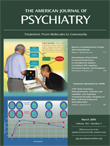Determinants of Real-World Functional Performance in Schizophrenia Subjects: Correlations With Cognition, Functional Capacity, and Symptoms
Abstract
OBJECTIVE: Impairments in adaptive life skills are a major source of disability in patients with schizophrenia. The relationship between adaptive life skills in real-world settings and performance on neuropsychological tests may be complicated by other factors that interfere with deployment of skills. Assessment of the ability to perform life skills under optimal conditions (i.e., assessment of functional capacity) has been proposed as a means to clarify these relationships. METHOD: The authors examined cross-sectional data from a study of the course of neuropsychological and adaptive life skills of older (age 50–85) schizophrenia patients (N=78). Functional capacity was examined with a performance-based measure (UCSD Performance-Based Skills Assessment), and case managers rated real-world adaptive functions (i.e., interpersonal skills, work skills, and community activities). Neuropsychological performance was assessed with a comprehensive battery, while symptoms were assessed with patient self-report and clinical ratings. RESULTS: Confirmatory path analyses were used to evaluate the effects of neuropsychological performance, functional capacity, and symptoms on the various domains of real-world functioning. Neuropsychological performance predicted functional capacity, which predicted all three domains of real-world functioning. Depression predicted interpersonal and work skills, while negative symptoms affected interpersonal skills independently of other predictors. CONCLUSIONS: Real-world adaptive life skills are predicted by neuropsychological performance, symptoms, and functional capacity. Neuropsychological performance contributes little to the prediction of real-world performance after accounting for functional capacity. In some domains, negative and depressive symptoms influenced real-world performance while not relating to functional capacity or neuropsychological performance.



